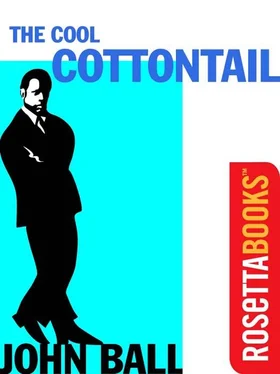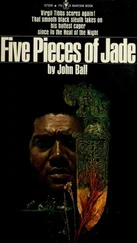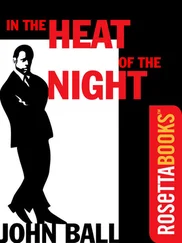John Ball - The Cool Cottontail
Здесь есть возможность читать онлайн «John Ball - The Cool Cottontail» весь текст электронной книги совершенно бесплатно (целиком полную версию без сокращений). В некоторых случаях можно слушать аудио, скачать через торрент в формате fb2 и присутствует краткое содержание. Год выпуска: 1966, ISBN: 1966, Издательство: RosettaBooks, Жанр: Полицейский детектив, на английском языке. Описание произведения, (предисловие) а так же отзывы посетителей доступны на портале библиотеки ЛибКат.
- Название:The Cool Cottontail
- Автор:
- Издательство:RosettaBooks
- Жанр:
- Год:1966
- ISBN:978-0-7953-1757-6
- Рейтинг книги:5 / 5. Голосов: 1
-
Избранное:Добавить в избранное
- Отзывы:
-
Ваша оценка:
- 100
- 1
- 2
- 3
- 4
- 5
The Cool Cottontail: краткое содержание, описание и аннотация
Предлагаем к чтению аннотацию, описание, краткое содержание или предисловие (зависит от того, что написал сам автор книги «The Cool Cottontail»). Если вы не нашли необходимую информацию о книге — напишите в комментариях, мы постараемся отыскать её.
The Cool Cottontail — читать онлайн бесплатно полную книгу (весь текст) целиком
Ниже представлен текст книги, разбитый по страницам. Система сохранения места последней прочитанной страницы, позволяет с удобством читать онлайн бесплатно книгу «The Cool Cottontail», без необходимости каждый раз заново искать на чём Вы остановились. Поставьте закладку, и сможете в любой момент перейти на страницу, на которой закончили чтение.
Интервал:
Закладка:
At these schools none of his teachers ever seemed to notice that he was a Negro. And he had long since dismissed any awareness that some of his teachers and fellow students were Japanese and others were not. In karate sparring, in particular, there was no time for such considerations. An opponent was a man of a certain physical structure and skill; overcoming him, if possible, took total concentration, total dedication to the art of karate, with no possible room for any other thoughts.
In aikido, which he had started relatively late, he wore the brown belt of the nikyu .
He had been a policeman for six years, and a dedicated karate student for eight, when a decision concerning him had been made behind the stony faces of the ranked karate examiners. After evaluating him many, many times they at last found him up to a stratospheric standard from which no exceptions were ever made. It had been the proudest, and most humbling, moment of his life when they had called him before them, he had bowed his obedience, and they had handed him the ultimate reward of the black belt. He had become a shodan , the lowest black-belt rank, but a member of the elite nonetheless.
Four days later an armed robber shot a filling-station attendant at night and in fleeing encountered a slender, unarmed Negro in street clothes. The robber had thrust out his arm to drive the harmless-looking man away and had received the greatest surprise he’d ever known just before sudden unconsciousness. He awoke much later in the prison ward of Los Angeles General Hospital with a broken arm in a plaster cast and the realization that he would shortly be back in Big Q for an extended stay.
That timely incident had marked the beginning of Tibbs’ career as an investigator, which was the Pasadena Police Department’s designation for certain of its detectives. On one of his first assignments he had worked as a shoeshine man for almost three weeks waiting for two men who were reported to meet there from time to time. When at last they had come, they had mistakenly assumed that the spiritless laborer working with the polish and brushes had no possible interest in their affairs. When he had finished their shines, he held out his hand, not for payment but to display a badge. At first they had not believed it; later they believed it completely, and for a short while, at least, one of the strands of the narcotics trade had been cut.
Tibbs, now the experienced professional, sat at his desk and went through a long file of missing-person reports. There were four possibles. He was noting them down when his phone rang and he was summoned to give a personal report to Captain Lindholm. He went gladly, but he had little to offer at that early stage beyond what was already on file.
“As I understand it, Virgil,” the captain said, “the body was entirely nude, no clothing on it or nearby.”
“No, sir,” Tibbs replied.
“Anything useful at all in the way of ground marks?”
Tibbs shook his head. “The soil is very hard out there, sir. I made a careful check and found nothing.”
“Then I assume there was not much to be found. Do you see any connection between the nude body and the fact that it was found where it was?”
“No, sir, at least not at this point. The people who run the place appear responsible. They have a good reputation. The sheriff’s office told me they have never had a complaint involving the nudist park-discounting crackpot calls, of course.”
“Have you any ideas at this point?”
Tibbs hesitated. “Only in part. It seems pretty clear that the body was stripped and the dentures removed to give us a job making an identification.”
“That seems logical, and except for the regular routine you haven’t much to go on.”
“There is one thing, sir.” Tibbs put a small box on the captain’s desk. “The murderer, if it was murder, overlooked something. I didn’t call attention to it at the time because I didn’t want to advertise the fact.”
“What have you got, Virgil?”
Tibbs pointed to the little box. “Contact lenses,” he said.
chapter 5
Whenever Virgil Tibbs spent a day, or a succession of days, of hard work without any fruitful result, he would refer to it as a “Yellow Face period.” He drew his reference from Sherlock Holmes’ famous adventure of The Yellow Face in which the immortal detective overreached himself, failed to come to the right conclusion, and ended up in humiliating defeat.
The next twenty-four hours constituted a Yellow Face period. Had the deceased been an itinerant-laborer type, he might never have been missed by anyone concerned enough to turn in a police report, but it was clear he had been a man of some substance and possibly even importance. Thus the normal expectation was that from some quarter an inquiry would come in concerning a missing person, who would turn out to be the body in the nudist-park pool. But no such person was reported missing.
Local fingerprint records were of no help, and the F.B.I. reported that it could not provide a make from its central files in Washington. Apparently the unknown man had never had his fingerprints taken, at least not in the United States.
Meanwhile Tibbs took another careful look at the four missing-person reports that he had already chosen as possibles. A little work eliminated two of them; one was a decided long shot; the fourth offered some slight hope.
Then, at ten in the morning, a woman, who from her appearance could have been the dead man’s wife, sailed with hesitant regality into the small lobby of the Pasadena police station and paused before the inquiry window.
“I would like to speak with a police officer,” she announced with thin-lipped determination.
The desk man, who had been alerted, sensed a good possibility and summoned Tibbs. When the investigator arrived, the woman looked coolly at him and repeated herself almost exactly. “I would like to see a police officer.”
“I am a police officer,” Tibbs replied. “May I help you?”
The woman continued to regard him coolly. “I would like to speak to one of your regular officers.”
“I am a regular officer, Ma’am.”
“Perhaps, then, I should ask to see a detective.”
At times, Tibbs’ patience wore thin. Normally he controlled himself well, but the early frustrations of the day were already beginning to tell on him. “Madam,” he said with enough firmness in his voice to convey authority, “ I am a detective and am at your service. Now, what may I do for you?”
The woman stared at him for a moment, turned without a word, and walked out through the lobby doorway.
Tibbs bent over the drinking fountain to regain his self-control. He took hold of the sides of the fixture for a moment and the muscles of his fingers locked tight. When he straightened up, he was himself once more.
“Call me if anything else comes up, Harry,” he said to the man on duty. “If she comes back, try to find out what it’s all about. If not, to hell with her.”
Harry understood and nodded; things like this had happened before.
The morning mail brought a letter from Officer Sam Wood, of the Wells Police Department. With pardonable pride he informed Tibbs that his advancement to sergeant had been approved and would shortly take effect. Despite the fact that he had lived all his life in the South and was a Caucasian, Wood’s was a very friendly letter. He reported that the music festival had been a definite success in Wells and that even the diehards now admitted that it had been a good idea. The town showed some few signs of reviving life due to the influx of tourist money. Miss Duena Mantoli, whom he had an engagement to see that evening, had specifically asked to be remembered, and sent her warm regards.
Читать дальшеИнтервал:
Закладка:
Похожие книги на «The Cool Cottontail»
Представляем Вашему вниманию похожие книги на «The Cool Cottontail» списком для выбора. Мы отобрали схожую по названию и смыслу литературу в надежде предоставить читателям больше вариантов отыскать новые, интересные, ещё непрочитанные произведения.
Обсуждение, отзывы о книге «The Cool Cottontail» и просто собственные мнения читателей. Оставьте ваши комментарии, напишите, что Вы думаете о произведении, его смысле или главных героях. Укажите что конкретно понравилось, а что нет, и почему Вы так считаете.












